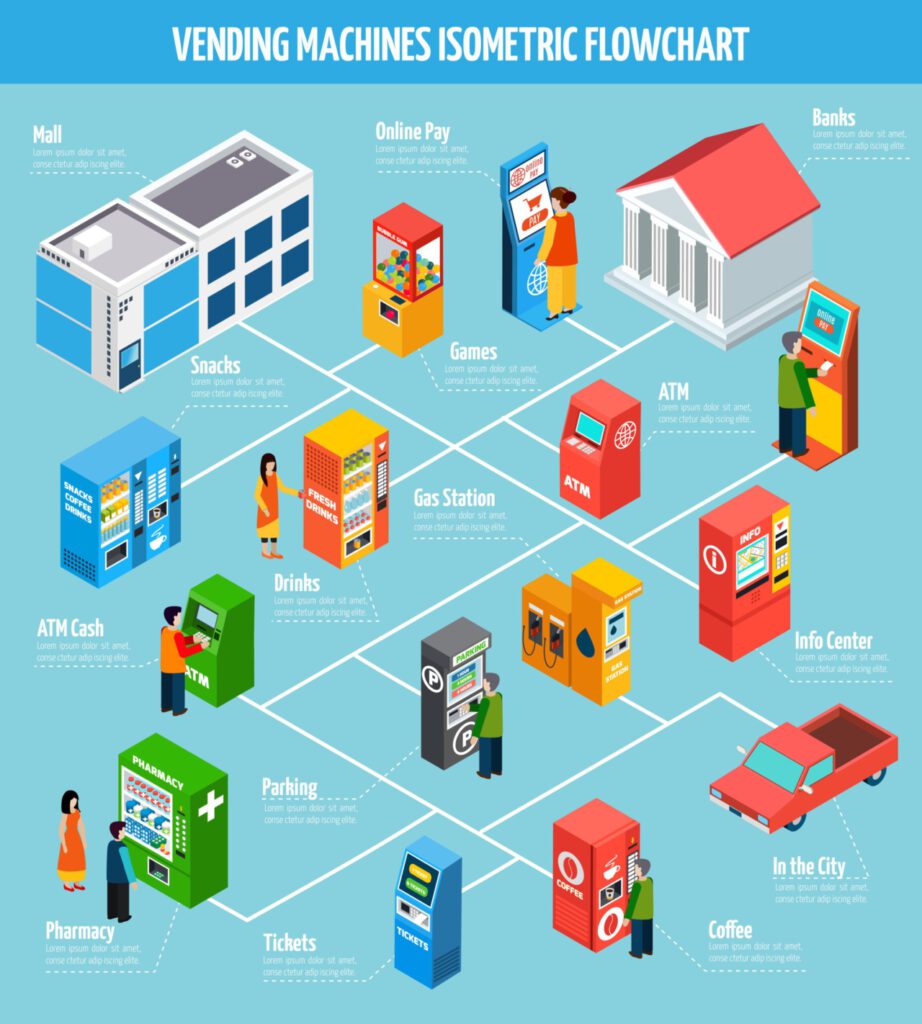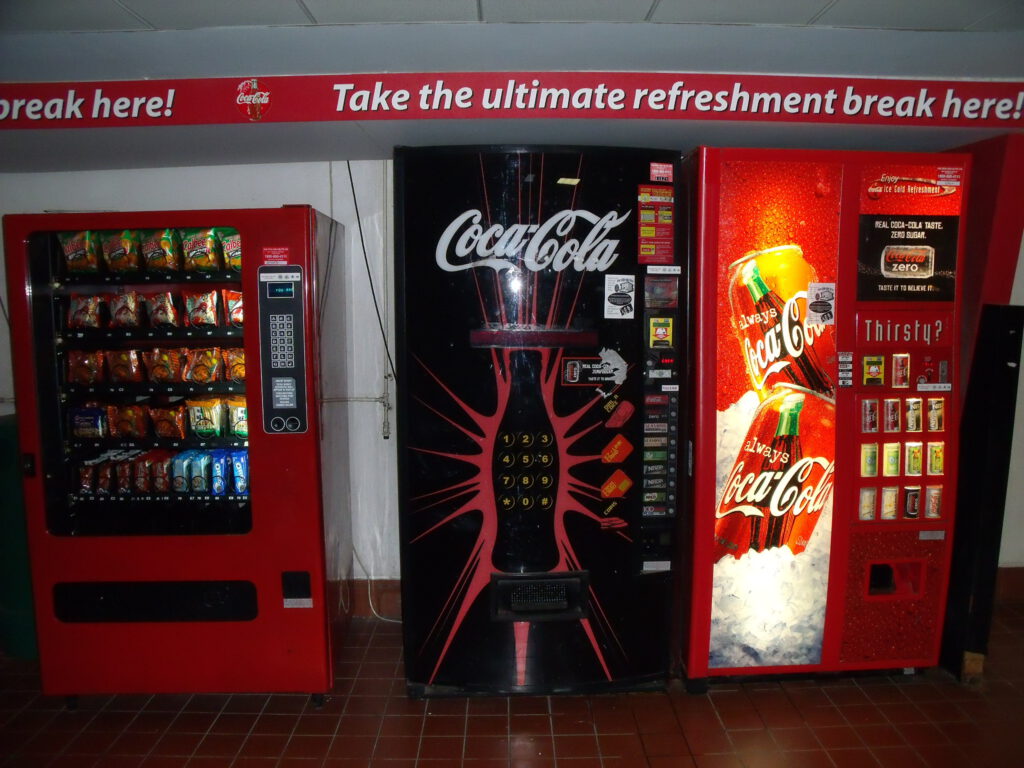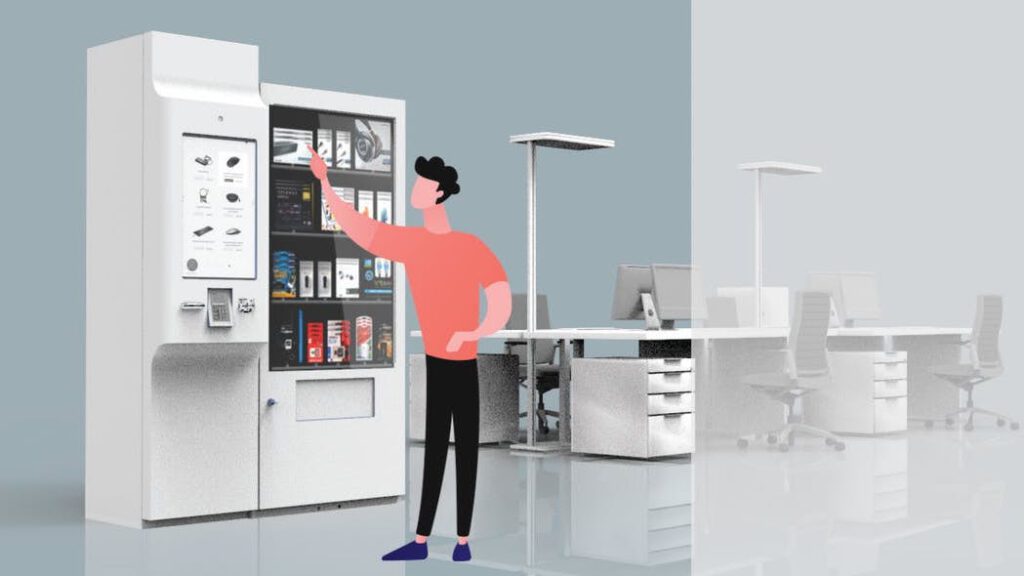A vending machine company

A vending machine business leads to:
1 – A reflection:
Have you ever thought about the company behind your snacks located in refrigerated cabinets? You know, the ones you see on the street or in certain shops at train stations or airports?
If you’re looking for a new business opportunity that you can do part-time, without special skills or training, and that can even involve your whole family, a vending machine business might be the perfect fit.
Just before the widespread COVID-19 shutdowns, the U.S. vending machine industry hit $8 billion, and global vending machine revenues topped $23 billion. Information from the web
Although the vending machine industry has been impacted during the COVID-19 pandemic, once people return to their workplaces and travel resumes, it may fully rebound and even continue its growth pattern.
Just in case you think of vending machines as just vending machines for candy bars and sodas, think again.
New food and beverage trends and improved technology make this an exciting time to start a vending machine business.
Vending machines are seeing an increase in healthier snack options and richer deals: Vending machines in Beverly Hills malls even offer gourmet delights such as caviar, snails and bottarga.

If you’re interested in starting a vending machine business, you’ll need to treat it like you would any other business. Here’s everything you need to know to get up and running.
Scaling: You can start with a few machines and grow your business if time and finances allow.
Low start-up costs: Besides the purchase of the machines, which can be financed, your investment costs are relatively low. You don’t need space in a building or office.
A little space in a garage, laundry room or basement is enough. Other than a vehicle to service your route, no other equipment or machinery is required.
Simplicity: Once the machines are in place, your only tasks are to maintain and restock the machines and then collect the money.
All cash transactions: There are no accounts receivable like in most businesses. You collect money from ATMs or credit card companies.
Flexibility: The vending machine business is ideal for families. You can easily train your spouse and children to help with shopping, storage, bank deposits, accounting and other tasks.
Apart from some start-up capital or financing, the only other requirement is a reasonable degree of physical fitness as machine maintenance involves handling and transport and some products can be heavy.
A vending machine business is also:
2 – A business opportunity
If you think this is the right business opportunity for you, here are the steps to start your own vending machine business.
a- Market research
As with starting any type of business, market research and planning are the keys to success. There are several ways to start a vending machine business, and each has advantages and disadvantages.
b – start
Purchasing machines gives you the most flexibility: you can start with a few machines and grow as opportunities arise and finances permit.
It also requires more legwork as you will need to research and purchase machines and then find and negotiate slots to place them (unless you are dealing with a machine distributor who sells machines and provides slots).
c – the purchase
This option gives you immediate cash flow from the existing business. However, it is essential to determine why the owner wishes to sell.
Essential background research includes reviewing accounts, inspecting machinery, reviewing existing contracts, and searching existing locations for possible problems.
d – a deductible
This is the easiest way to get into the vending machine business. A franchise gives you an established business model based on selling one or more products.
Typically, however, in addition to the start-up franchise fee, the franchisor takes a percentage of the profits or a monthly fee. As a franchisee, you are generally limited to purchasing or leasing machines and products from the franchisee company.
As with any for-profit business, you must acquire all necessary licenses and permits and register your business for tax purposes. Be sure to check any local and/or regional requirements.
e – next
Whichever option you choose, the next step should be to write a business plan . Market research to test the feasibility of your business idea is an integral part of the business plan.
For example, by checking the locations of existing vending machines and talking to business owners, you may discover that the vending machine market in your area is already saturated.
f – pitches
As in retail and real estate, location is a critical success factor in the vending machine business.
Ideally, you want your machines to be in high-traffic locations, such as malls, large office complexes, schools, airports, and in front of stores.
Ideally, you want good locations that don’t already have vending machines.
You will likely find, however, that most of the ideal locations in your area are already taken, and in some cases existing sellers will have exclusive contracts with the landlord.
Keep in mind that even with the right location, your product selection needs to adapt. Even popular products may not sell in a high traffic location if the target market is not suitable.
A candy vending machine outside a health food store may not be a recipe for success.
g – theft and vandalism
When researching locations, avoid areas with high incidences of theft and vandalism. Damage or theft will quickly eat into your profits. Preferred locations should be highly visible, monitored and in view of security cameras.
h – contracts
You will have to compensate business or building owners for the installation of machinery on their premises and the use of their electricity. This is usually done as a negotiated percentage of your gross sales.
The average commission is around 7% but can vary greatly depending on the number and size of machines. As the owner of the machines, you will be contractually obligated to provide a statement of sales and commissions to the owner at regular intervals.
This can also be done in the form of a location rental and in the case of premises, with a commercial lease. Pay attention to the rules of commercial leases!

A vending machine company obliges you to certain obligations
3 – Your contract as owner
Types of machines and products sold
The duration of the contract
Termination clauses for breach of contract or lack of profitability
Exclusivity (if applicable)
Rights to replace, increase or decrease the number of machines
As always, it is wise to have the contract drafted or reviewed by a lawyer.
a – buy or rent equipment
If you are not franchising or buying an existing business, you will need to acquire one or more machines to get started.
Before you do, you’ll need to decide what products you intend to sell (food, drink, or specialty items) and what type of vending machines you want.
b – bulk machines
These are small handfuls of bulk snacks such as gumdrops, peanuts, and M&M’s. Costs can range from $50 to $200 and can have the lowest profit margins.
You would need multiple machines to generate substantial income. On the plus side, the machines do not require refilling as often and are simple to maintain and repair.
c – Mechanical Machinery
These are larger than bulk machines and can dispense multiple products. Prices can start at $2,000 per machine, but profit margins are much higher than bulk machines.
d – Electronic machines
These use modern touch screens and can accept other forms of payment such as bills and credit cards. Electronic machines have the highest initial cost but are more reliable than mechanical machines.
A next-gen electronic soda dispenser will cost at least $5,000. More sophisticated machines that have greater capacity, sell different products, and accept multiple forms of payment can easily double or triple the cost.
Unfortunately, since the machines are generally unattended, the vending machine industry is very susceptible to vandalism and theft. If you invest a lot of money in buying a machine, you may need to insure it.
e – used machines
If you’re looking to start small or just want to save some money on a discounted product, used machines are the way to go.
Amazon and eBay or are great sources for new and used vending machines. Reviews are particularly useful for obtaining information on the reliability of products.
You can perform comprehensive searches for equipment based on type, price, and location.
Vending machine dealers are plentiful, so search the Internet and local trade publications to find dealers in your area.
f – warranties and repairs
New vending machines usually come with a parts warranty of at least one or two years. Used or refurbished equipment may come with a more limited warranty.
If you are into mechanics, you can learn how to fix machines yourself. Otherwise, you may need to seek the services of a repair technician.
g – profits
Maximize your profits with the right products, chat with the company or owners about the products they want. In some cases, the type of products will form part of the contract.
You also need to think about the target area and market. Some products sell well in most public spaces, while others are more location-dependent.
Hot beverages such as coffee, tea, and hot chocolate can sell well in most places.
Vending machines for snack items such as sodas, water, candies, chips, and candy bars can also work well in most environments.
Hot food and sandwich makers can work well in commercial settings, schools and universities.
Candy, toys and other specialized machines can be suitable for shopping malls, supermarkets, playgrounds and other places frequented by families.
Personal items such as hygiene products and over-the-counter medications may be suitable for washrooms in transit facilities, shopping malls and gas stations.
h – fresh products
Legislation in your jurisdiction may dictate healthy options. Many options are available, including:
Fresh sandwiches and salads
Water or fruit juice instead of sodas
Granola bars instead of candy
Baked potato chips
sugar free gum
fruit cups
Nuts

A vending machine business is all about benefits
4 – daily life
a – supply products
Maximize the profits of your vending machine business by paying the lowest possible unit price on the items you purchase for your machines. Research wholesale food and beverage suppliers and compare prices.
b – good customer service
As with any business, succeeding in the vending machine business means providing good customer service. For a vending machine operator, this means:
Schedule visits to your sites as needed to keep machines fully stocked.
Keep your machines clean and in good condition. Dirty and poorly maintained machines are a drag on customers.
Provide contact information such as an email address on the machines so customers can report any issues.
- A telephone contact is appreciable during the day. Because the night…
If applicable, rotate products by expiration date so that the oldest inventory sells first.
Analyze sales and regularly consult with business or property owners on what types of products are most desirable for customers. Store machines accordingly.
Maintain a good relationship with the contact person at the machine locations, as they may be on the receiving end of complaints or refund requests.
Conduct yourself in a professional manner at all times.
Providing top-notch customer service is one of the best ways to increase sales and improve your business reputation, which is essential if you hope to grow your business by soliciting new locations for equipment.
c – the approach
A vending machine business has few barriers to entry. What you need most is what any start-up business requires: hard work and a drive to succeed.
Keep in mind that like most small businesses, you are unlikely to get rich running a vending machine business. But being your own boss and taking the lead is rewarding in and of itself.
And if you have enough locations, vending machines can generate regular income for you.
So why dont you contact us ?